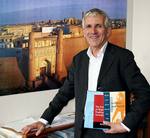New look at Central Asian hotspots
 Economics Economics
It's been 15 years since the collapse of the Soviet Union and the world is suddenly looking afresh at the independent countries of Central Asia. "It was a sleepy part of the world in the 1990s," said Richard Pomfret, Professor of Economics at the University of Adelaide, "but following the 9/11 attacks, the United States invasion of Afghanistan and the oil boom of recent years, suddenly everyone is interested in this area. "With oil prices up and huge new reserves discovered in the Caspian Sea, Central Asia is becoming one of the big oil-producing regions of the world. "With the current focus on terrorism and the fact that these are Islamic countries, next door to Afghanistan, there is naturally a lot of interest in the stability of the region and whether revolutions are likely." Professor Pomfret is a world authority on the economies of Central Asia: Kazakhstan, Tajikistan, Turkmenistan, Uzbekistan and Kyrgyz Republic. His field is economic development, with a special interest in former centrally planned economies. He's also done a lot of work in and written two books on China. His first book on the former Soviet economies, The Economies of Central Asia, was published by Princeton University Press in 1995 and is regarded as the standard book on that part of the world. Princeton recently requested a follow-up. The Central Asian Economies Since Independence, just published, provides a fresh analysis of the economic prospects for the region and likely impact on political stability. "I'm not a political scientist, I'm looking at the situation on an economic basis," Professor Pomfret said. "Since the Soviet Union collapse, there has been a big decline in income and increase in poverty and this drives instability. These people thought they were living in a superpower and now find they are poorer than India and very cut-off from the rest of the world." Following the Soviet Union break-up in 1991, Professor Pomfret was commissioned by the United Nations to advise the Governments of Kazakhstan, Tajikistan, Turkmenistan, Uzbekistan and Kyrgyz Republic on creating their new economies and spent most of 1993 travelling between the countries. "All the things we take for granted, they had to start from scratch," he said. "They were still using Soviet currency." Professor Pomfret said the advice given to these governments didn't produce immediate outcomes. "Hopefully it helped them to be better policy-makers in managing their monetary and trade policy and, if mistakes were made, to have them corrected." Professor Pomfret has more recently been advising the World Bank and the UN on how to measure poverty, how to design policies to reduce poverty and how to assess policy impacts on the agriculture sector. The Central Asian Economies Since Independence (July 2006) has been published by Princeton University Press and can be ordered online at www.pupress.princeton.edu for US$65. Story by Robyn Mills
Open Day 2006To hear more about Economics and the Professions at the University of Adelaide, visit Open Day on Sunday 20 August, North Terrace, 10am-4pm. www.adelaide.edu.au/openday
|





